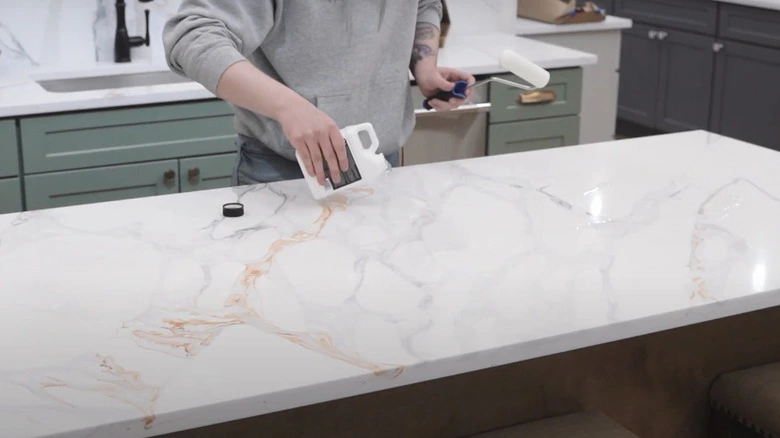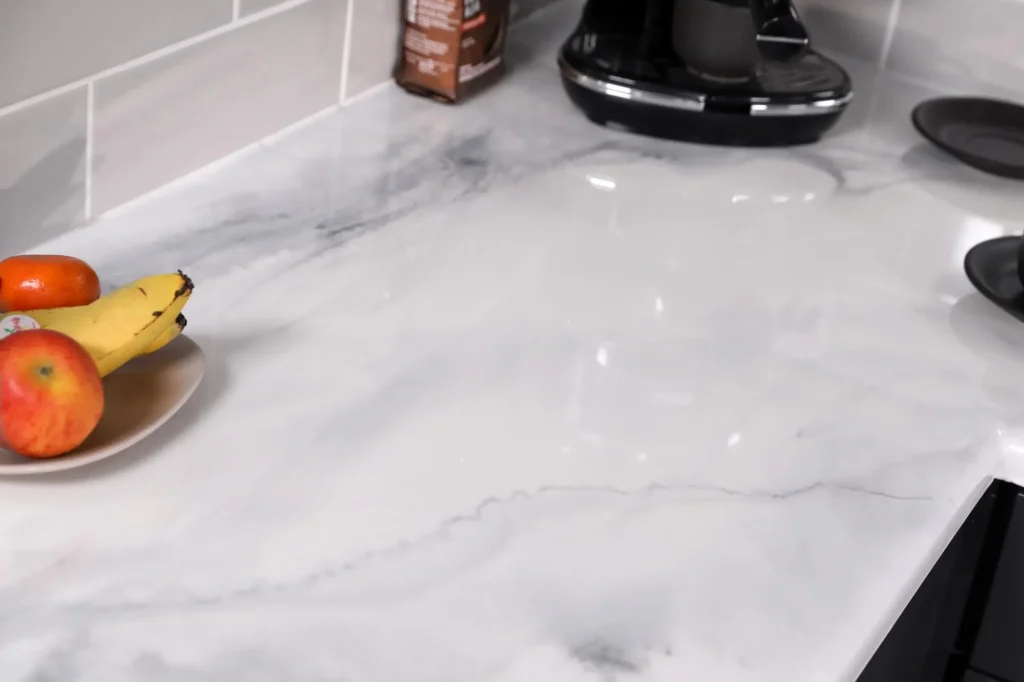Quartz countertops have become a top choice for modern kitchens and bathrooms due to their sleek appearance, unmatched durability, and low maintenance. But one common question homeowners ask is: Do quartz countertops need to be sealed?
In this article, we’ll dive deep into whether you should seal quartz, the difference between sealing quartz and other stones like granite, and how to maintain your quartz surfaces for lasting beauty and performance.

What Are Quartz Countertops?
Quartz countertops are engineered stone surfaces made from approximately 90–95% ground natural quartz crystals combined with resins and pigments. This mix creates a non-porous, durable slab that resists stains, scratches, and bacteria buildup.
👉 Learn more: What is a marble slab?

Do Quartz Countertops Need Sealing?
No, quartz countertops do not require sealing.
Unlike natural stone such as granite or marble, quartz is non-porous, meaning it doesn’t absorb moisture or liquid spills. This built-in resistance to bacteria, mold, and stains makes sealing unnecessary for standard care.
That said, while sealing is not required, understanding your countertop surface and how to enhance its protection is beneficial for longevity.
Why Is Sealing Common for Other Countertops?
- Granite and marble countertops are porous and prone to absorbing liquids, leading to staining and etching.
- Regular sealing of natural stones is essential to create a moisture-resistant barrier.
- Quartz, being engineered and resin-bound, already has this barrier.
👉 Related article: How to Care for Quartz Countertops?
When Might Sealing Quartz Be Considered?
Though quartz countertops don’t need sealing, certain situations may call for additional surface protection:
1. Low-Quality Quartz Brands
Not all quartz is created equal. Some low-cost, off-brand quartz slabs might have inconsistencies in resin distribution or quality, making them slightly more porous than top-tier options.
2. Outdoor Quartz Countertops
UV rays, rain, and outdoor conditions can degrade resin binders over time. Using a surface protectant can offer added protection in outdoor settings.
3. Heavy Use Commercial Kitchens
If your quartz countertop is in a bakery, restaurant, or commercial prep area, a quartz-safe sealant may offer additional protection from food acids and constant wear.
How to “Seal” Quartz Countertops (If You Choose To)
If you decide to use a surface treatment to enhance the durability of your quartz, follow these steps:
Step 1: Choose the Right Product
Select a quartz-safe sealant or surface polish made specifically for engineered stone. Do not use natural stone sealers designed for granite or marble.
Step 2: Clean the Surface
Before applying anything, thoroughly clean your countertops with warm water and mild soap. Remove all residue and let the surface dry completely.
Step 3: Apply the Sealant
Spray or spread the quartz-safe treatment evenly over the surface with a soft microfiber cloth. Avoid abrasive materials.
Step 4: Let It Sit and Buff
Allow the treatment to sit for 15–30 minutes (per product instructions), then buff with a dry cloth to remove excess.
Step 5: Repeat As Needed
Reapply every 6–12 months in high-use areas, if needed. Always follow the product instructions.
Best Practices for Long-Term Quartz Care
Even without sealing, regular maintenance will keep your quartz countertops looking flawless.
✔ Use coasters for acidic drinks (wine, citrus, vinegar)
✔ Clean spills immediately
✔ Use trivets for hot pans and dishes
✔ Avoid harsh chemical cleaners (bleach, ammonia)
👉 More maintenance tips:
How to Maintain Quartz Countertops?
Quartz Countertops vs. Granite: The Sealing Debate
| Feature | Quartz Countertops | Granite Countertops |
|---|---|---|
| Porosity | Non-porous | Porous |
| Sealing Needed? | No | Yes (yearly) |
| Maintenance Level | Low | Medium |
| Appearance Options | Uniform, many colors | Natural, varies by slab |
| Cost Range (per sq ft) | $50–$120 | $40–$100 |
Quartz Countertops Cost and Value
While sealing isn’t part of the upkeep, understanding the cost and return on investment helps buyers make informed decisions.
- Quartz countertops cost: Typically $2,000–$5,000 per kitchen depending on size and brand.
- Quartz countertops prices vary based on:
- Thickness (2cm vs. 3cm)
- Color (premium whites and veined designs cost more)
- Edge profiles and backsplash installation
Top brands include Caesarstone, Cambria, Silestone, and MSI.
Styling with Quartz: Design Possibilities
Quartz fits nearly any design scheme:
- Quartz countertops kitchen island – Bold focal point in open-concept homes
- Quartz countertops backsplash ideas – Full-height slab for seamless luxury
- Quartz countertops outdoor – Weather-resistant engineered slabs
- Quartz countertops colors – White, gray, black, marble-look, and concrete-style finishes
Final Thoughts: Sealing Quartz—Necessary or Not?
In most residential applications, sealing quartz countertops is not necessary. The non-porous surface offers built-in protection, making quartz a leader in low-maintenance countertop solutions.
However, in special cases like commercial kitchens or outdoor use, a surface treatment might offer peace of mind.
Focus on:
- Proper cleaning routines
- Avoiding heat and harsh chemicals
- Periodic inspections for signs of dullness or wear
This approach ensures your quartz countertops maintain their beauty for years to come.

